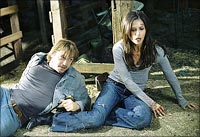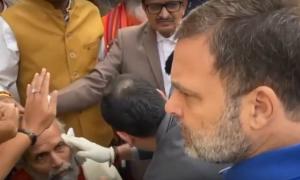With the unceremonious failure of his first Hollywood film, The Return, a supernatural thriller starring scream queen Sarah Michelle Gellar, British filmmaker Asif Kapadia will have to struggle hard to convince Hollywood to finance his films.
The movie opened at number eight with a meager $4.8 million weekend in nearly 2,000 theatres in North America. Though it did not cost a fortune -- it was made for under $15 million -- and could eventually recover its cost, it was still an underperformer, especially when one remembers that horror films usually open big in North America, many grossing $20 million in three days.
Distributor Rogue/Focus did minimum publicity for the film. It did not screen the film for the critics, a sign that it feared terrible reviews. Critics slammed the film for being boring and incoherent. 'You may see scarier movies this year,' declared The New York Times, 'but none so redolent of decomposition.'
Even Gellar, the star of big slasher hits as The Grudge and Cruel Intentions could not give life to the film, they complained. 'As B-level suspensers go, though, The Return isn't actively awful,' noted The Boston Globe, adding it was 'just slow and cursed with a lead who acts with her T-shirt.'
Gellar plays a business woman who starts having nightmares of a murder that occurred 15 years ago and is drawn to an old farmhouse -- the location of the murder.
With his first film, The Warrior starring Irrfan, winning plaudits from reviewers ranging from London's Guardian to The New York Times, there were high expectations for it to do well in the art houses. But the film, shot entirely in India, did not find an audience on both sides of the Atlantic.
When Kapadia accepted the project, based on a script by newcomer Adam Sussman, he found possibilities of making a thriller with spirituality.
'It is an essentially a very American movie,' he noted in the press kit for The Return. 'But it had a sensual central idea of something spiritual, something otherworldly. Different people -- in different religions -- have been brought up with the concept that people might die and come back in another life in another form.'
Like in The Warrior, the new film too has elements of redemption.
'It offers the view that people are on some sort of path and that we're not all separate beings,' he continued. 'Somehow, there's a force out there that links things up. You can try to come back to correct something that happened to you in another life.'
Gellar quickly saw the karmic dimensions of her role.
'It offers the view that people are on some sort of path and that we're not all separate beings,' he continued. 'Somehow, there's a force out there that links things up. You can try to come back to correct something that happened to you in another life.'
Gellar quickly saw the karmic dimensions of her role.
 'When we first meet her (Joanna, her character), she's fairly lost; living her life, but not experiencing it,' she mused. 'She had a rough childhood, ran away, took a job that she wasn't necessarily passionate about but was good at -- and allowed her to travel, so that she was never in one place long enough to worry about belonging. But things start happening, and she starts to deteriorate very quickly and goes on a frightening and passionate journey.'
'When we first meet her (Joanna, her character), she's fairly lost; living her life, but not experiencing it,' she mused. 'She had a rough childhood, ran away, took a job that she wasn't necessarily passionate about but was good at -- and allowed her to travel, so that she was never in one place long enough to worry about belonging. But things start happening, and she starts to deteriorate very quickly and goes on a frightening and passionate journey.'But the critics and the audiences did not find anything startling, scary or passionate about the film.
'The slow, uneventful film offers no visual ingenuity, just some cheap shocks courtesy of crashing sound cues,' complained The Seattle Times. 'The movie's biggest riddle is whatever happened to the credibility of Sam Shepard, collecting a paycheck for a few scenes as Gellar's dubious dad.'
'Kapadia,' the reviewer continued, 'has a repertoire of second-hand Hitchcock camera moves, along with a harrowing amount of pretense. It's like he can't even be bothered trying to entertain the audience.'
The weekend box office was led once again by the crude but funny comedy Borat which grossed a strong $29 million, taking its 10-day total to $68 million.
Among the newcomers, The Return was not the only dud. The $30 million A Good Year starring London-based investment expert settling down in a French chateau, earned just about $3.8 million. Starring Russell Crowe and directed by Ridley Scott (the two had worked previously on the big hit The Gladiator) arrived in America after bombing in the United Kingdom.







More from rediff